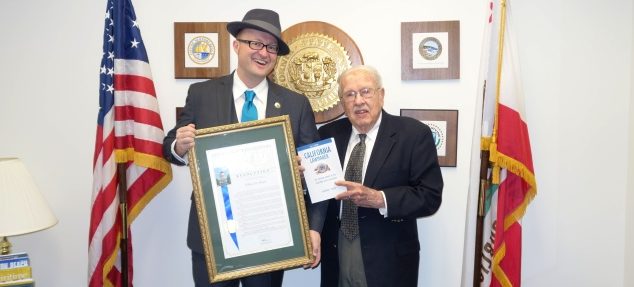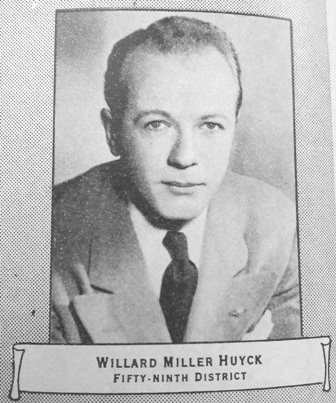News
Where Are They Now? Assemblyman Willard Huyck
 Willard Huyck, right, and Assemblyman Matthew Harper. (Office of Matthew Harper)
Willard Huyck, right, and Assemblyman Matthew Harper. (Office of Matthew Harper)Former Assemblyman Willard Huyck is probably one of the more notable state legislators that you’ve never heard of. He was elected to the State Assembly at age 29 and served two terms before leaving to run a medical supply company. Now, more than 70 years after first arriving at the Capitol, Huyck is California’s oldest former legislator ever.
Willard Miller Huyck was born, weighing in at 11 pounds, in January 1917 at the Ramona Hospital in San Bernardino. He grew up in Los Angeles, graduating from Fairfax High School, and earned a degree in Business Administration from University of Southern California.
Sworn into the Assembly in January 1947, Huyck arrived as the second youngest member of the incoming class.
When he graduated from USC in 1940, the war in Europe and Asia had already begun, so instead of diving into his career, he instead chose to join the military. In November 1941, just weeks before the Pearl Harbor attack, Huyck enlisted as an Aviation Cadet in the Army Air Corps. He was assigned to the 13th Air Force in the South Pacific, which ran long-range bombing campaigns in support of the island-hopping strategy that would eventually lead to victory in the Pacific war.
In 1943, Huyck married Coramae Anderson, who remains his partner in everything from trips to the library to answering questions from a Capitol Weekly contributor. Willard and Coramae had two children, Willard, Jr. and James Forrest. Their older son, Willard, is a writer and director best known for writing the “American Graffiti” and “Indiana Jones and the Temple of Doom” screenplays as well as contributing to the script for “Star Wars”.
After finishing his war service, the Huyck family moved to Beverly Hills and Willard began working in public relations. By the late 1940s, Huyck was actively involved in the local community as President of both the Aseptic Thermo Indicator Co. and the Mutual Fire Insurance Company as well serving on the board of the Coast Federal Savings and Loan Association.

(California Blue Book, 1950)
By the end of World War II, Beverly Hills had been represented in the Legislature by Charles W. Lyon for nearly 30 years. Starting in the Assembly in 1915, Lyon had moved up to the state Senate for more than a decade before returning to the lower house and becoming Speaker. Assemblyman Lyon had a large impact on southern California, authoring the legislation that authorized the construction of both the Southern Branch of the University of California (today’s UCLA) as well as the State Building at Los Angeles. By 1946, Speaker Lyon was clearly one of the most powerful figures in state government, when suddenly an opportunity for higher office appeared.
After losing a bid for U.S. Senate in 1944, Lieutenant Governor Frederick F. Houser decided to leave office and announced that he would not be seeking a second term in 1946. Speaker Lyon quickly announced that he would be retiring from the Assembly to run for Lt. Governor. The resulting open seat in the 59th Assembly District couldn’t have happened at a better time for Huyck, who by now was well-known in the district and had strong ties to the business community. Although it was a crowded primary, with eight Republicans running, his public relations experience and local connections helped him win the primary with nearly 70% of the vote.
Sworn into the Assembly in January 1947, Huyck arrived as the second youngest member of the incoming class. He was one of 27 veterans in the Assembly that year, including his classmates Laughlin Waters (who went ashore at Utah Beach on D-Day) and Delbert Morris (who survived the sinking of the USS Lexington).
As a legislator, Assemblyman Huyck focused on legislation relating to the military and veterans as well as governmental efficiency. During his first regular session, 28 bills he authored or coauthored were signed into law. After his reelection in 1948, he became the Chairman of the Assembly Committee on Legislative Procedure as well as a member of the Education, Public Health, and Governmental Efficiency and Economy committees.
“My gosh. I don’t feel that old,” Huyck said recently.
At the end of his second term, Huyck decided that the time had come to leave office and refocus his efforts on his business. “While I was in office,” Huyck explained, “I had a small business manufacturing items for the surgical and medical field.” Once his attention was back on the business fulltime, it took off. Over the next few years, Huyck worked on the development of new medical devices and received a number of patents including a temperature indicator for blood storage and a sterilization indicator. After a long career, Huyck made the decision to retire and enjoy life. “When I was ready to retire, I sold the company to Parke-Davis which itself was sold to Pfizer,” he says. “Then I stayed retired.”
Over the years, Willard Huyck has gradually climbed the list of oldest legislators. He has been California’s oldest living former legislator since 2011. In January, he received a resolution from Assemblyman Matthew Harper when he became only the fourth former state legislator to live longer than a century. Most recently, in mid-August, Huyck became our oldest-ever former legislator. “My gosh. I don’t feel that old,” said Huyck recently. In the background, Coramae chimed in, “He doesn’t look or act 100 either.”
Willard says that he spends his days doing what everyone else does. “I spend a lot of time these days doing fairly regular things,” said Huyck. “We go shopping or to the library, and I spend some time on the computer.” Never one to shy away from new technology, Huyck says that he says that he enjoys writing emails and playing Solitaire, and follows the latest political news closely. “I’m very interested in the politics,” he said.
In four months, the Huycks will celebrate their 75th anniversary.
—
Ed’s Note: Alex Vassar, often referred to as the “unofficial historian of the Legislature,” is a state worker and the author of “California Lawmaker.”
Want to see more stories like this? Sign up for The Roundup, the free daily newsletter about California politics from the editors of Capitol Weekly. Stay up to date on the news you need to know.
Sign up below, then look for a confirmation email in your inbox.

Leave a Reply